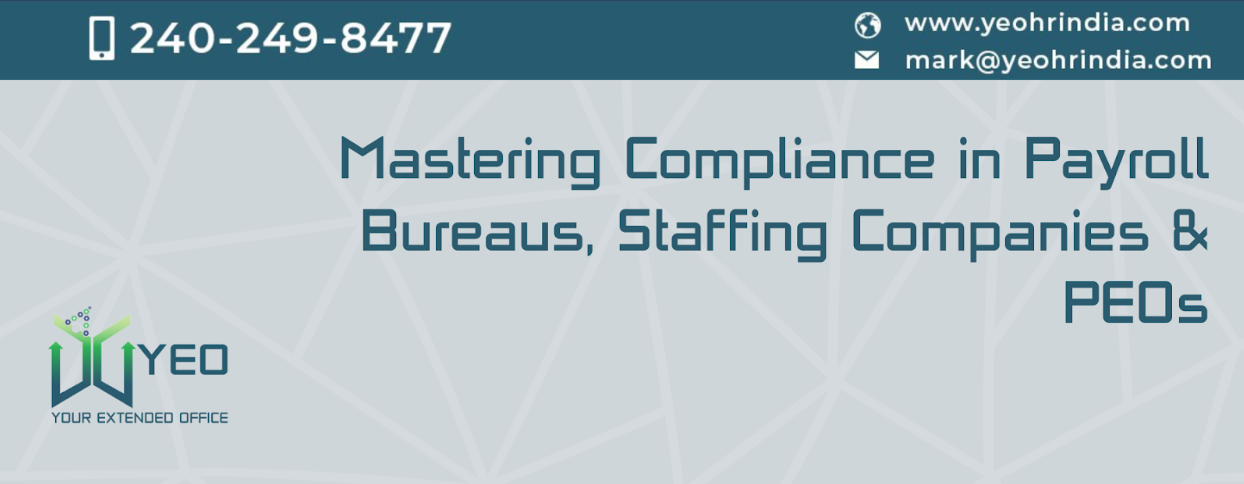
Managing compliance with ever-evolving tax codes, labor laws, and industry regulations presents a constant challenge for payroll bureaus, staffing companies, and professional employer organizations (PEOs). Ensuring compliance is not merely necessary to avoid hefty penalties and damage to a business’s reputation, but it’s also crucial to ensuring smooth operations and maintaining client trust. As regulatory requirements continue to grow ever more complex, many organizations in these sectors have recognized the value of partnering with expert outsourcing providers like YEO HR India to support them in navigating these challenges and ensuring compliance across the board.
By providing end-to-end HR back-office support, enterprise services, and tech services, YEO HR India is ideally positioned to help payroll bureaus, staffing companies, and PEOs stay ahead of the compliance curve. With in-depth knowledge of industry-specific regulations, combined with expertise in leveraging technology to streamline compliance processes – YEO can empower these organizations to manage compliance effectively and efficiently while focusing on their core business activities.
In this blog post, we will dive into the critical aspects of compliance management for payroll bureaus, staffing companies, and PEOs, along with the unique challenges posed by each of these industries.
We will explore the following key areas:
- Understanding industry-specific compliance requirements for payroll bureaus, staffing companies, and PEOs.
- Identifying potential compliance risks and challenges related to taxes, labor laws, employee benefits, and data privacy.
- Practical tips and best practices that organizations in these sectors can adopt to mitigate compliance risks and maintain a competitive edge.
By unpacking these essential components, we aim to arm decision-makers within payroll bureaus, staffing companies, and PEOs with the knowledge and practical tools needed to navigate the compliance landscape successfully.
Understanding Industry-Specific Compliance Requirements
The landscape of regulations and mandatory compliance requirements varies for each of the payroll bureaus, staffing companies, and PEO sectors. To successfully navigate the intricacies of compliance, it is crucial to have a clear understanding of the specific regulatory requirements for your organization. Let’s delve into the unique requirements for each of these industries:
- Payroll Bureaus: Compliance challenges in this sector often involve managing payroll taxes, adhering to multi-state tax rules, and constantly updating wage and labor laws specific to the clients’ locations.
- Staffing Companies: Compliance issues for staffing organizations can encompass worker classification, employment background checks, wage and hour regulations, and adherence to industry-specific labor laws.
- PEOs: Compliance challenges for PEOs extend to co-employment tax compliance, workers’ compensation claims and management, benefit regulation adherence, and employee policy development in accordance with labor laws.
Identifying Compliance Risks and Challenges
Maintaining compliance involves recognizing common risks and challenges that organizations may face. These may include:
- Tax Compliance: Many organizations struggle with staying updated on changes in tax codes and accurately processing clients’ tax obligations, leading to potential penalties and client dissatisfaction.
- Labor Laws: Wage and hour laws, employee classification, and evolving industry-specific regulations can present difficulties, especially for firms operating across multiple jurisdictions.
- Employee Benefits: Ensuring compliance with employee benefit regulations involves adhering to the various requirements set forth by federal and state laws, pension regulations, and mandatory insurance laws.
- Data Privacy: Organizations need to adhere to data privacy laws, such as GDPR, to protect their clients’ and employees’ personal information from potential breaches and ensure the confidentiality of sensitive data.
Practical Tips and Best Practices for Mitigating Compliance Risks
Implementing practical solutions and adhering to best practices can enhance an organization’s ability to mitigate compliance risks, ensuring long-term success:
- Develop a Culture of Compliance: Foster a company-wide commitment to compliance by emphasizing its importance and integrating it into core organizational values and processes.
- Conduct Regular Audits: Regular audits can proactively identify potential compliance issues and allow your organization to address them before they lead to legal or regulatory penalties.
- Ensure Accountability: Implement a clear hierarchy of responsibility for managing compliance, ensuring that the appropriate personnel is responsible for monitoring and enforcing compliance standards.
- Continuously Train Employees: Offering ongoing education and training about industry-specific regulations helps employees stay up to date on compliance requirements and equips them to manage compliance challenges.
Conclusion:
Navigating the complexities of regulatory compliance in payroll bureaus, staffing companies, and PEOs requires expert knowledge, strategic planning, and constant vigilance. Partnering with experienced back office outsourcing providers like YEO HR India can offer valuable support and guidance in managing compliance risks while allowing your organization to focus on core business activities. By embracing a culture of compliance, staying informed about industry-specific regulations, and implementing practical solutions, your organization can stay ahead of the curve, foster client trust, and ensure long-term success in an ever-changing business landscape.
Looking to boost your company’s productivity and revenue while reducing operational costs? YEO HR India’s extended office services can help! With end-to-end HR back-office support, enterprise services, and tech services, YEO is the perfect partner to help you achieve your goals. Contact us today to learn more about our extended office services and take your business to the next level!





